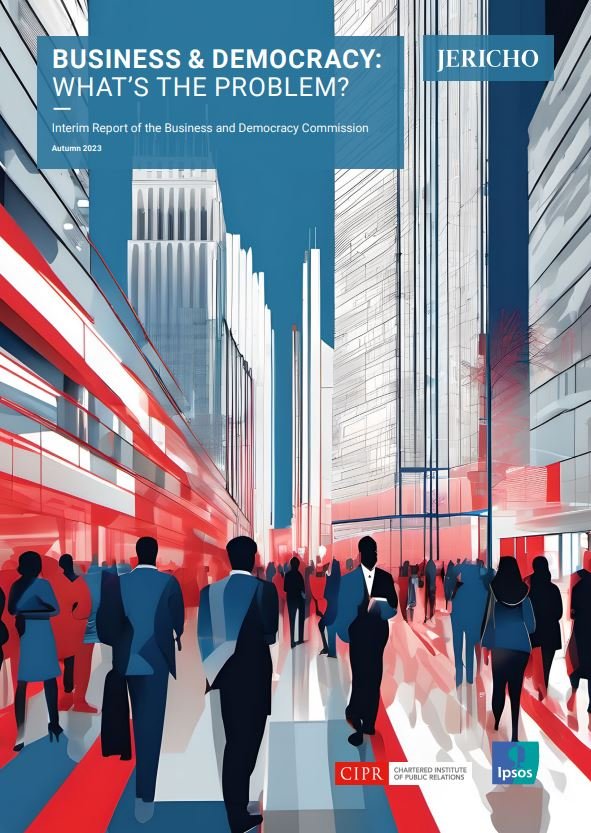Business and Democracy: What’s the Problem? Interim Report from the Business and Democracy Commission
Chaired by Sir Ian Cheshire, Chairman of Channel 4 and Landsec the Business and Democracy Commission is an ambitious initiative led by Jericho, supported by Ipsos and Chartered Institute of Public Relations (CIPR), to help recast the relationship between business and democracy.
The Interim report, explores the key challenges in the evolving relationship between business and democracy. It outlines why business and democracy rely on each other, and sets out some of the key challenges and opportunities for business along with the potential risks of doing nothing.
21st Century Business is expected to serve not just its shareholders but also to display good corporate citizenship and defend liberal democracy/society. It is expected in 2023 to boycott Russia over the war in Ukraine, to invest in skills, to assist in the political process of levelling up, to drive societal change through its equal employment and well-being policies, take care of its environmental impact and report on all this in great detail.
Starting in the UK, the Business and Democracy Commission is taking a practical two-stage approach. The first is this interim report which seeks to clearly articulate and explore the challenges at hand. In the second stage, it will present actionable ideas to help fix or at least start to fix, the relationship, especially in terms of what businesses can proactively contribute and collaborate with others.
The Commission believes that businesses have a unique and important role to play in upholding the values and practices of a democracy that truly works. It wants boards and business leaders to be able to refer to the final report to start their journey to a better democratic future including what they do culturally and structurally to ensure they act as the best possible business citizens.
The Commission is Chaired by Sir Ian Cheshire, and we are fortunate to have a group of Commissioners who bring a wealth of expertise and experience to the table including: Mete Coban, CEO, My Life My Say; Margaret Heffernan, Author & Entrepreneur; Robin Hodess, Strategy Lead, The B Team; Baroness Denise Kingsmill, Labour Peer and Member of the Board of Directors of Inditex; Alastair McCapra, Chief Executive, CIPR; Matthew Painter, Managing Director, Ipsos Corporate Reputation; Ruth Yeoman, Fellow, Kellogg College, University of Oxford; and Anthony Zacharzewski, President, The Democratic Society.
The report identifies three categories of problems in the relationship between business and democracy: (1) democratic efficacy, (2) business and the public interest, and (3) the relationship between business and democracy. The report outlines why business and democracy rely on each other, identifies how we got into the confused state we seem to be in and highlights some of the key challenges and opportunities for business to support democracy along with the potential risks of doing nothing.
So, the question for the new leaders is what should they do, to be the responsible leaders and how can they/ their businesses help support liberal democracy on which business depends, but where strains are emerging especially as capitalism seems to be failing recently to produce the jobs and rising living standards that have underpinned the liberal political economy.
The challenges at the heart of the Commission’s enquiry will include:
What is the correct role for a business in a healthy democratic society?
What are the dangers/ benefits of a business going beyond obeying laws and regulations and engaging in active political topics?
What does stakeholder as opposed to shareholder capitalism mean when it comes to democratic engagement?
For more information about this project, please contact becky.holloway@jerichochambers.com
***
Jericho programmes invite contributions from across the spectrum: professionals and business leaders, designers, experts and those with lived experience. All views are welcome. Please get in touch if you would like to contribute or become part of the next steps of the programme.

